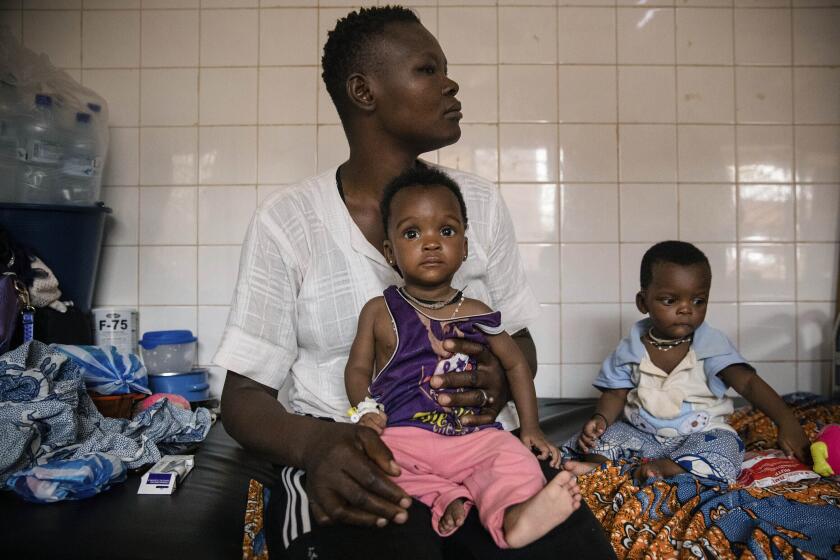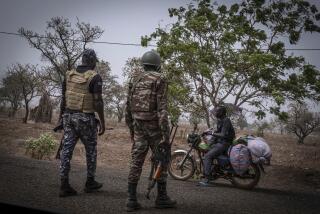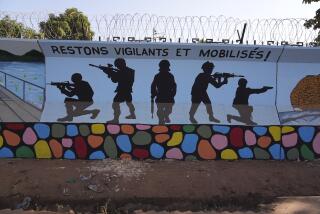Groups linked to Al Qaeda and Islamic State take root on the coast of West Africa

- Share via
ATACORA, Benin — The militants pressured Zackari to join their movement, and he turned them down.
Now he’s frightened of their revenge. He has been on the run from the jihadi fighters for more than a year. They regularly call the 33-year-old, warning: “We haven’t forgotten about you.”
Groups linked to Al Qaeda and Islamic State have been spreading for years from the vast arid expanse south of the Sahara desert — the Sahel — into wealthier West African coastal states such as Benin. Militants once were believed to want to use coastal nations such as Benin, Togo and Ghana as bases for attacks on Sahel governments. Now militancy is taking root.
Benin has been the hardest hit. This year it had more than 10 times the number of violent incidents involving jihadis than Togo did, according to the Armed Conflict Location & Event Data Project.
Attacks by jihadis against civilians in Benin nearly tripled from last year, from more than 30 to approximately 80. The overall number of incidents involving jihadi groups rose by more than 70%.
Two attacks by Al Qaeda-linked insurgents in Mali’s restive north have killed 49 civilians and 15 government soldiers, the ruling military junta said.
“There’s full expansion, regular preaching. They’re establishing cells, they have a lot of presence,” said Kars de Bruijne, senior research fellow and head of the Sahel program at the Clingendael Institute.
The jihadis’ activity in Benin is concentrated in the north of the country, where they try to recruit people or get them to be informants, creating division within local populations. Residents of one small town tucked behind lush hills and windy unpaved roads told the Associated Press last month that civilians can no longer move freely.
People in Materi live in constant fear because of the jihadi threat. The fighters are planting explosives and carrying out abductions in the area, instilling fear among the population while eroding state legitimacy. The government has imposed a curfew and a ban on gatherings.
“I can’t sleep at night, we’re not free to travel, to move,” Materi resident Florence Bati said. “People are too afraid.”
Kidnappings by jihadis in Benin surged from zero in 2021 to 33 this year, according to the Global Initiative Against Transnational Organized Crime, which analyzed figures from the Armed Conflict Location & Event Data Project and other sources. Explosions have also increased, residents say.
Tensions escalate between Niger’s new military regime and the West African regional bloc that has ordered troops deployed to restore democracy there.
Several months ago, a woman was killed by an explosive while fetching wood, said locals. Women have stopped going into the forest, instead finding kindling closer to home, they said. In October, one aid group distributed portable ovens, which require less wood.
People are being displaced from their homes as attacks increase, sparking concerns of a humanitarian crisis.
In August, more than 12,000 people were displaced from their homes in the neighboring Atacora and Alibori regions, up from about 5,000 in March, according to the United Nations.
Violence is also pushing people from their farms. The U.N. estimates that tens of thousands of people could face crisis levels of food insecurity.
The government is trying to stem the problem by reinforcing the military along the borders and recruiting thousands of soldiers.
Locals in the north say they’ve seen a surge of soldiers but say the army is under-equipped and sometimes responds hours late when called about an attack.
The government denies that.
This article was originally on a blog post platform and may be missing photos, graphics or links.
The military is well-equipped, able to respond to the incursions that occur and is conducting advanced training while trying to acquire more ground and airborne resources, said Col. Faizou Gomina, commander of the Mirador operation, which is dedicated to fighting the jihadis.
Unlike neighboring Burkina Faso, Niger and Mali, which are being overrun by violence and which ousted French troops after undergoing military coups and seeing surging anti-French sentiment, Benin is still open to help from its former colonial power, which left in 1960.
France doesn’t have a permanent base in the country, but at the behest of Benin, its troops deployed in the region can participate in training programs with Beninese soldiers, French military spokesman Col. Pierre Gaudilliere said.
While Benin’s government is shoring up its borders, it’s also trying to conceal the scale of the crisis to maintain its image, say residents in the north. It’s cracked down on freedom of speech and arrested journalists who report on insecurity.
Local officials insist the problem doesn’t extend beyond the border with Burkina Faso.
Vice President Kamala Harris has arrived in Ghana to begin a trip to Africa. She will be in Africa for a week.
“There is no terrorist, no movement, no organization, no group that has settled or tried to settle in our department,” said Robert Wimbo Kassa, the mayor of Materi.
An agricultural nation of 13 million people, Benin has invested billions of dollars in propping up culture and tourism and is building a $1.5-billion industrial zone 27 miles outside of the city of Cotonou aimed at creating 300,000 jobs by 2030.
The information gap has left people in other parts of the country unaware of the security issues in the north. People in Cotonou said that they didn’t know about the jihadi problem, believed it was fake news, or that it was a problem limited to neighboring countries.
Rights groups say the government’s attempts to control the information space, while arbitrarily arresting people believed to be working with the jihadis, is pushing people into the militants’ hands.
“The jihadists live with the populations, the citizens know them, but they refuse to denounce them because the government doesn’t encourage people to do so,” said Bertin Assogba, coordinator for Durable and Develop Reference, a local aid group focused on defending human rights.
The United Nations food agency says millions of hungry people in West Africa are left without aid because it is struggling with limited funding.
The international community is trying to implement lessons from the Sahel by sensitizing people into not joining the jihadis, and organizing community dialogues with officials to foster trust. Diplomats and aid groups also say there’s been a rush of investment.
Last year, the World Bank invested $450 million in a five-year project aimed at reaching some 4,600 border communities in northern Benin, Ivory Coast, Ghana and Togo. It will be focused on preventing the spread of conflict by strengthening local institutions and economic opportunities. But residents say development projects take too much time to materialize.
In the meantime, militants are winning in the realm of public perception.
Jihadis enter impoverished villages promising to build roads and hospitals if they come to power, residents say.
The government “should hurry and bring infrastructure,” said Raoufou Bandele, the coordinator for Action for Mutual Aid and Development, a local group. “It’s important because jihadists are around and their message is very clear: They want to change things.”
More to Read
Sign up for Essential California
The most important California stories and recommendations in your inbox every morning.
You may occasionally receive promotional content from the Los Angeles Times.














